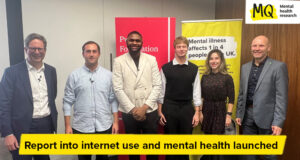
Carla Naumburg, PhD, LICSW is a clinical social worker and the author of five books, including the bestselling How to Stop Losing Your Sh*t With Your Kids and its middle-grade companion How to Stop Freaking Out. Her writing has appeared in The New York Times, The Washington Post, The Huffington Post, CNN, and Mindful Magazine, among other places. Carla lives in Massachusetts with her husband and two daughters.

Our host, Gabe Howard, is an award-winning writer and speaker who lives with bipolar disorder. He is the author of the popular book, “Mental Illness is an Asshole and other Observations,” available from Amazon; signed copies are also available directly from the author.
Gabe makes his home in the suburbs of Columbus, Ohio. He lives with his supportive wife, Kendall, and a Miniature Schnauzer dog that he never wanted, but now can’t imagine life without.
To book Gabe for your next event or learn more about him, please visit gabehoward.com.
Producer’s Note: Please be mindful that this transcript has been computer generated and therefore may contain inaccuracies and grammar errors. Thank you.
Announcer: You’re listening to Inside Mental Health: A Psych Central Podcast where experts share experiences and the latest thinking on mental health and psychology. Here’s your host, Gabe Howard.
Gabe Howard: Hey everybody, welcome to the podcast. I’m your host Gabe Howard. Calling into the show today we have Carla Naumburg, PhD, LICS-W. Dr. Naumburg is a clinical social worker and the author of five books, including the best-selling “How to Stop Losing Your Sh*t with Your Kids.” Her latest book, “How to Stop Freaking Out,” is out now. Dr. Naumburg, welcome to the podcast.
Carla Naumburg, PhD: Thank you so much. I’m really excited to be here. And please call me Carla.
Gabe Howard: Oh, Carla, thank you so much for being here and I will absolutely do so. Now, when I was reading the summary of your new book, I was really intrigued by a sentence that was on the back of it and it said, “readers will learn what a freak out is and isn’t.” And my thought was isn’t? By the time we reach our teenage years and our adult years, aren’t we really aware of what a freak out is, or is there a nuance that I’ve missed?
Carla Naumburg, PhD: I don’t know that there’s a nuance. I just think most of us, unless you’re a social work nerd or someone who spent a lot of time in therapy, both of which checked. I checked both those boxes. I don’t. I don’t think we’ve really thought about it. I mean, let me ask you this, Gabe. You spent. You’re like me. You spend a lot of time thinking about, talking about, nerding out about living in this world of mental health, mental wellness, mental illness, all these things. How would you describe a freak out?
Gabe Howard: So. So to me, a freak out is when somebody is just sort of out of control. Right? They’re just like they’re angry, they’re mad. They’re they’re they’re sort of just like drooling over something that’s angry. Right? It’s just like, I can’t believe you did that. Why would you even say that? I mean, can you believe this? It doesn’t go into any productive areas. It’s not. It’s not constructive. It’s not beneficial. It’s just it’s just unresolved anger. And it’s usually loud. I almost always see freak outs as loud.
Carla Naumburg, PhD: So you definitely hit on a couple of the important points. One is that there are strong emotions behind freak outs. And it doesn’t have to be anger always. Often it’ll look like anger, but it can be anxiety, sadness, fear, confusion, overwhelm. Like almost any strong emotion. And for anybody who’s ever spent time with little kids, you know that even being overwhelmingly happy can lead to a freak out. Like you’ll see a little kid just in a great mood, really overwhelmed with joy or laughter, and then the next minute they’ve just lost it. And so really, any strong emotion can trigger a freak out. And so in the book, because this is a complicated topic that I want to make a little simpler, I use the acronym FART.
Gabe Howard: Okay. All right. Just just. You went there.
Carla Naumburg, PhD: [Laughter] I went there.
Gabe Howard: I mean, a book. A book for parents to help their middle school teenagers handle freak outs. Should probably contain a fart joke.
Carla Naumburg, PhD: Well, just to be clear,
Gabe Howard: I can see it.
Carla Naumburg, PhD: That just to be clear, FART was in “How to Stop Losing Your Sh*t with Your Kids,” because I’m always trying to remind folks that life is far too serious to be taken seriously. Thank you, I think it was Oscar Wilde for that one. And “How to Stop Freaking Out” is meant for the kids. And what kid ages 8 to 11, by the way, doesn’t love a good fart reference? Also, some 47-year-old social workers like fart references to. Just to be clear. So the f in FART is for feelings, right? That that strong emotion that you identified the A and the R for automatic and reactive. So even though a freak out might be building over time, in the moment of the explosion, it can feel pretty automatic, just like a switch has been flipped and blammo we’re losing it. And the reactive generally means that we are reacting to something, whether it’s, you know, your sister throwing the remote control at your head or something that your best friend said at school two hours ago, and you’ve been simmering on it, and then you come home and your sister throws the remote control at your head, but there’s freak outs don’t come out of nowhere, even though it can feel like it, because we’re not always so good at noticing, right? So sometimes it can feel like we’ve lost it for no apparent reason. But the truth is, there’s something. There’s something that triggered it. Right? So that’s the F, the A and the R, and then the T is for too much, which means our reaction is too much for the moment. It’s more than it needs to be. So let me give you an example. Let’s say.
Gabe Howard: I love examples. I love a good example.
Carla Naumburg, PhD: Who doesn’t love a good example? Right?
Gabe Howard: Who doesn’t love a good example?
Carla Naumburg, PhD: So let’s say you’re 11 years old and you sadly have not yet read my book, so you don’t know the difference. But you’re 11 years old. You’re walking your little, I don’t know, three-year-old cousin down the sidewalk, and your cousin darts out as if they’re going to run into traffic. So what do you do? You reach out and grab their arm and pull them back onto the sidewalk. Maybe you pull them a little too hard, or maybe you don’t. But the point is, you got them out of the street. Okay, so that was a moment driven by your feelings. You probably had a strong emotion of fear that your cousin was going to get hit by a car. Your behavior was automatic and reactive. It happened very quickly and you were reacting to, you know, the kid running into the street. I wouldn’t actually call that a freak out because I don’t think you went too far. I think this very strong, emotionally fueled, automatic, reactive moment was a reasonable thing to do to protect your cousin from getting hit by a car that wasn’t a freak out. But if in that moment, you then, like, you know, lose it and start screaming at them and stomping your foot and you’re so angry, you throw your backpack on the ground and you’re just like, yelling at them because they almost ran into the street. That might be bordering on a freak out, because you might be taking the moment too far.
Gabe Howard: When I think about freak outs and I think about parents dealing with their children freaking out, and really, any adult, you know, from teachers, coaches, religious leaders, etc. who work with children,
Carla Naumburg, PhD: Yeah.
Gabe Howard: I think that they don’t want kids to freak out. They see freaking out as universally bad. What’s your take on freak outs? Are they universally bad?
Carla Naumburg, PhD: I think they’re universally unpleasant, but that’s not the same thing as bad. I think they’re also universal. Like universally universal. Can I say that? I just did.
Gabe Howard: I think so, yeah. Yeah. That works.
Carla Naumburg, PhD: It’s just something we all do. And they look really different, like you said. Freak outs are always loud. Well, I’ve certainly seen people freak out in the comments on the internet. Right. Just going too far with whatever they’re typing, whatever they’re saying. And it’s quiet. Except for it feels incredibly loud when you’re reading it, so. But the point is, I don’t want to call them bad because it’s something we all do. So what I would say is they’re unskillful. And by that I mean they are unlikely to bring you closer to your goal. Whatever your goal is, whether it’s, you know, getting that toy you don’t want to share or getting paired with your best friend in history class or making the varsity team or whatever it is freaking out is unlikely to bring you closer to your goal. So I would call it unskillful, but I try to stay away from good and bad because then it makes us feel bad and we don’t need to feel bad.
Gabe Howard: Putting on my working with kids hat.
Carla Naumburg, PhD: Yeah.
Gabe Howard: And I’ve had, you know, a number of kids who freak out over any number of things. I think
Carla Naumburg, PhD: All the things.
Gabe Howard: Anybody who’s worked with children have done this. We’re always trying to curb this behavior, and we’re mostly curbing this behavior by just telling them to stop it. And I’m going to use myself as an example. I’m always in the stop it. Calm down. Don’t do that. Why are you acting that way? You know, you need to take a time out. You need to count to ten. I’m really not helping them manage or channel their emotions in any way. I’m just getting them to stop it.
Carla Naumburg, PhD: So let’s remember I’m a social worker, but I’m also a parent with two kids. So if I were to sit here and say to you, Gabe, you should not just tell these children to stop it, you should sit down with them and process their emotions and blah, blah, blah. Like that would be a little bit of BS, because of course, there have been a million times when I’ve looked at my kids and just been like, I just need you to stop it right now. I just need and here’s a great example. My daughters, who are both younger teenagers, just recently came home from seven weeks away at summer camp. And they were completely exhausted. They had a great summer. They were completely exhausted and on like the second night home, my younger daughter, who’s 14, just lost it. She was in bed. She was sobbing. She was upset. She was really freaking out. And it was just exhaustion. Sadness about missing her friends, anxiety about school, starting all of these things. I spent like an hour with her, Gabe trying to calm her down, using our coping skills, our breathing, our distractions.
Carla Naumburg, PhD: Do you want to read a book? Do you want to listen to music? Can I snuggle you? Blah blah blah blah blah. And finally, after an hour, I said, look, kiddo, I’m exhausted. I got nothing left. I’ve tried everything. You seem to really need this freak out. I think you just need to cry yourself to sleep. And I think that’s a legitimate thing to do, and it doesn’t feel great when it’s happening. But I bet you’re going to wake up in the morning and feel better. It is totally okay to cry yourself to sleep. We’ve all done it. And that’s what ended up happening. And that was essentially me being like, just stop it. I can’t do anything for you. And so I do think there are times in every human being’s life where we just have to stop it. Whether you’re in a job or you’re on a podcast, and all of a sudden you just want to start crying, that is not the moment. Now I’m just saying, or you’re like.
Gabe Howard: I’m. I’m glad. I was worried, I was worried.
Gabe Howard: I was like, oh, no, what happened?
Carla Naumburg, PhD: [Laughter] We’re good, Gabe. But look, we all need this ability to just kind of suck it up, right? That’s the thing we have to learn, because there are moments in life where that’s our only option. And I’d love those moments to be balanced out by times when we can sit with someone who has the patience in that moment, the capacity in that moment, the compassion in that moment to just sit with us and be like, yeah, this is an awful moment, but I’m just going to hang out with you. And then when the kid is calm, coming back to them and saying, you know, what? Can we figure out together what was going on for you? What are your coping skills? And for example, I know a kid who has freak outs fairly regularly. And what this kid needs in that moment is to play piano. Like he has really identified that this is something. It’s one of the only things that calms him down. And so where can he get access to a keyboard or a piano? Because if he’s losing it, this is just the thing he needs. And how amazing is that? To have the time and the space and the adult support. And I say adult support. Whether you’re a kid or an adult who just needs another adult to support you, to figure out what triggers you and what calms you down, and being able to do that. Because I got to tell you, Gabe, when anybody my husband, my kids, anybody tells me to calm down, I just get madder. Like that doesn’t help.
Gabe Howard: [Laughter] Yeah, that really is like the joke on the internet, right? Like, how do you make your spouse mad? You know, ask them to calm down, right?
Carla Naumburg, PhD: Right. Tell them to relax.
Gabe Howard: When they’re upset. Yeah. I just it’s always worked. It’s like making more money or eating healthier. It’s just it’s so simple, right? Just, just just follow this rule.
Carla Naumburg, PhD: It’s so easy.
Gabe Howard: It’s so easy, so easy.
Carla Naumburg, PhD: So look. It totally doesn’t help when someone tells us to relax. What does help is knowing how to calm down our buttons. And, Gabe, this is where I’m going to introduce you to my second favorite acronym BuRPs.
Gabe Howard: We have FARTing. We have BuRPs. All right.
Carla Naumburg, PhD: Let’s do this. I am nothing if not consistent with my commitment to juvenile humor. So the way I think about all this is let’s pretend our bodies are covered in invisible buttons. And these buttons, when we have strong feelings, confusing thoughts, difficult moments, pain in our bodies, we’re uncomfortable, we’re tired, we’re hungry. Whatever it is, our buttons get bigger, brighter and more pushable. And then something happens. Whether it’s your spouse telling you to relax or a kid being annoying and it pushes your buttons and you lose it, right? The BuRPs are our button reduction practices, which are the strategies and habits we can develop in our lives that will make those buttons smaller, dimmer, harder for people to find, and way more sort of button pushing resistant like people are going to have to life is going to have to work harder to find those buttons and push them.
Gabe Howard: And we’re back with doctor Carla Naumburg, author of “How to Stop Freaking Out.”
Carla Naumburg, PhD: I don’t like it when somebody tells me to relax. But if you leave me alone when I’m having a freak out, eventually I’m going to remember, oh, I need to go pet my cat. I need to go stand outside on my porch and take some deep breaths. I need to turn on a really hilarious TV show and just zone out and laugh for 20 minutes. And that will recalibrate me. And with my kids, my teenagers, they don’t want to hear my suggestions for their BuRPs. They’re not really interested in my suggestions about anything right now because they’re teenagers. But if I can stay calm when they’re freaking out, eventually they they’re at a place where they can identify. I need to go lay down in bed and pet the cat. We spend a lot of time petting cats in our house. Or I need food, or I need a nap, or I need to check in with a good friend, or I need to do one of these things that’s going to calm me down. So we spend a lot of time, you know, BuRPing in our house, even if we don’t call it that.
Gabe Howard: I really like what you’re saying, but there always does seem to be two schools of thought when it comes to kids freaking out.
Carla Naumburg, PhD: Yeah.
Gabe Howard: The first one is you have to let them feel their feelings, work it out on their own. And this is perfectly natural and zero intervention. And the second one seems to be the we have to stop this immediately. This is bad behavior. This is a sign that my child is going to grow up to be a serial killer and never hold down a job, and probably live in my basement forever. We don’t seem to have a real middle view on this.
Carla Naumburg, PhD: I love that you are bringing this idea of nuance, because I don’t love either of those extremes, to be honest. And let’s throw in the reality that parents are just human beings. Like we’re prone to freak outs too. We’re just trying to figure this all out. We’re making it up as we’re going along. We’re exhausted. Like, I would love to meet a parent because I’m certainly not that parent who’s like, I have a plan for responding to my child’s freak outs, and I will do it consistently every single time, because that is absolutely not my experience of being a human being or a parent. My plan is, do the best I can in any moment, and sometimes that best is unbelievably awesome. And sometimes it’s like toilet water, and most of the time it’s somewhere in the middle. But yeah, the reality is we all freak out sometimes, and if we’re lucky, we get a good balance of times when there are people around us who are patient and understanding and can sit with us in our uncomfortable feelings and not lose their minds while we’re losing ours. And that’ll be balanced. Like we said before with the times when somebody just says, hey buddy, I know this is a rough moment, but we got to go and you got to suck it up and get your shoes on.
Carla Naumburg, PhD: Otherwise, you’re gonna be late to school because we need both. We need to adapt to both. But what I try to do in this book is normalize this, because I think you and I both are on the same page, that there is no reason why any, any of this should be stigmatized, why any of this should be hard to talk about. It is completely normal to freak out. And I also want to give kids the skills and strategies to freak out a little bit less often and a little bit less intensely, because we’re never going to eradicate the freak out that’s going to be around for adults and kids forever. It just happens sometimes. And so I also talk in the book about how to pull yourself out of that moment, because I think that the prevailing advice is just don’t do it. And then when it happens anyway, as it will, none of us know what to do. So I don’t love either extreme. I think we’re all just doing the best we can.
Gabe Howard: I really struggle with this too, because I know a number of adults who have freak outs and we all just tolerate it. In fact, I don’t think you could turn on the television and not see any show that shows the male executive not get angry and slam his door after pounding his hands on the desk and yelling at the employees. And everybody’s like, well, but he’s such a great boss and you know, and we we have to tolerate this. I mean, think of like Michael Scott from The Office and his freak outs or
Carla Naumburg, PhD: Oh, they were amazing, epic.
Gabe Howard: Even go back to The Flintstones. Right? I mean, even our kids cartoons show Mr. Slate just screaming at his employees. But this was okay because he’s otherwise productive. But yet that’s sort of maladaptive, right? He’s freaking out on people. And I think sometimes that’s the nuance that we don’t teach children. It is okay to feel your feelings, but it’s not okay to project your feelings onto others or to yell at others. And I think that parents are struggling with this, especially in the, the mental health craze of, of after COVID. Everybody’s like, no, this is all healthy. Emotions are good, but emotions can still be too much or
Carla Naumburg, PhD: [Laughter] Ugh.
Gabe Howard: Can still bother people. So it’s I really do think it’s handcuffing parents because they’re not sure what to do or what to say. And then those two extremes cropped up.
Carla Naumburg, PhD: Okay. So many thoughts. First of all, Michael Scott from The Office is amazing. I just have to comment on that and we’ll move on. Second of all, I just have to say that.
Gabe Howard: [Laughter] He is terrible at his job.
Carla Naumburg, PhD: [Laughter] Oh, he’s terrible.
Gabe Howard: I mean, it is. I should point out, both of my examples are examples of people who suck at their jobs, but they’re still in high end positions, right? And the world still tolerates their freak outs.
Carla Naumburg, PhD: Fair, fair. So yes. Okay I have a lot I can say about that. But because I could just talk about this all day. But let’s talk about kids and parents.
Gabe Howard: Yes. Kids and parents. Kids and parents. Kids and parents.
Carla Naumburg, PhD: First of all I’d like to make a distinction when we’re talking about the difference between thoughts, feelings and behaviors. So we all have thoughts. They’re just words strung together in our mind. Sometimes they’re accurate, sometimes they’re not. I could sit here and think I’m a unicorn or the president of the United States all day long. That doesn’t make it true. We can’t control the first thought we have, but we can often control or influence the second thought we have. So I think to myself, I’m a unicorn. And then my next thought is, oh my God, I am absolutely a unicorn. Or it’s like, maybe I’m not a unicorn. Time to move on. So those are our thoughts. Where people get hung up is they will often believe the thoughts they have, including thoughts like I’m a terrible person, or only kids who are out of control have freak outs or something like that. And those are just not true thoughts. They’re just words strung together. The second thing I will say is about our feelings is that no feeling is ever wrong. No intensity of feeling is ever wrong. It’s just the feeling we’re having. And they’re always pretty accurate for whatever our thoughts and bodily sensations are. So if we are having a thought like, I’m going to go to school and I’m never going to have any friends, then our feelings are probably anxiety and fear.
Carla Naumburg, PhD: That thought probably isn’t true, but the feelings are pretty accurate given the thought, and no feeling is ever wrong. We can feel hatred, we can feel rage, we can feel jealousy. It’s not wrong. It’s deeply unpleasant. But I will never fault a kid or a human being for having a feeling. Where we can really start to draw lines is around behavior. You can have any thought you want, you can have any feeling you will have any feeling because you can’t control your feelings. But where we really need to think about what you can control is your behavior. And so you can feel like you hate your sister in this moment. You can feel like you wish you didn’t have a sister, but you can’t slam the door in her face, right? That’s what I really try to distinguish with kids is what do you do when you have unpleasant, overwhelming, confusing thoughts? What do you do when you’re dealing with really unpleasant emotions? And how do you make sure all of that doesn’t end up into the freak out, which is often not always, but a behavior that’s problematic?
Gabe Howard: One of the things that I always remind myself when I’m working with kids is that freak outs are normal. They’re not just normal for children, they’re not just normal for adults. They are just normal. And
Carla Naumburg, PhD: Totally.
Gabe Howard: Sometimes we respond just because we don’t like them, right? We don’t like it when people freak out. We don’t like it when adults freak out. And we really don’t like it when kids freak out. But we have control over children. We’re able to talk to children not as our equals, but as an authority figure, and we’re able to tell them to stop it. We’re able to move them away. We’re able to just do more.
Carla Naumburg, PhD: You have made so many good and interesting points. So my brain is like doing a little explosion right now. One of the really important things you pointed out is the power dynamic between adults and kids. So we adults, in theory at least, have functional prefrontal cortexes, right? This part of our brain that doesn’t fully come online until we’re in our early 20s. It’s the part of our brain behind our foreheads that really is like this adulting, planning, figuring out emotional regulation. All of this stuff happens there. So kids literally don’t actually have this part of their brain, like those neurons are still developing. And so that’s one of the reasons why they freak out so much. One of the things that can happen for kids is that a freak out can actually feel really unsafe, depending on the child, depending on the intensity of the freak out they can feel. As you pointed out at the beginning of the podcast, Gabe really out of control and that feeling of out of control-ess can be very scary, and it is incumbent upon us to do whatever we can to help our child feel safe. And the other thing I want to be clear about is parenting is unbelievably hard, and doing our best in the moment is often not, to be honest, not an option for many of us. Because we’re exhausted, many parents are working. And if you’re not working outside the home, you’re spending all day home with your kids, which is a unique form of torture.
Carla Naumburg, PhD: I mean, delightful, delightful, but like really, really challenging and exhausting. And many of us don’t have the skills and strategies and information and support and resources that we need. So when we’re talking about helping a kid through a freakout, setting a limit versus not setting a limit, I just want to remind everyone that we parents are walking around pretty drained and exhausted ourselves. And so the resources we need to not freak out at our kids or to be our best selves with our kids often aren’t available to us. It’s a tricky, hard situation.
Gabe Howard: Dr. Carla Naumburg’s latest book, “How to Stop Freaking Out,” is out right now. I know you can get it wherever they sell books, but do you have your own website that people can visit?
Carla Naumburg, PhD: Absolutely. People can go to CarlaNaumburg.com for, you know, all my books, all my writing, everything. And I encourage you to get your book at your local independent bookseller.
Gabe Howard: Thank you so much, Carla, and we will talk to you next time.
Carla Naumburg, PhD: Thanks so much.
Gabe Howard: Carla, you are so welcome and I want to give a great big thank you to all of our listeners. My name is Gabe Howard, and I’m an award-winning public speaker who could be available for your next event. I also wrote the book “
Mental Illness Is an Asshole and Other Observations,” which you can get on Amazon. However, you can get a signed copy with free show swag or learn more about me just by heading over to my website, gabehoward.com. Wherever you downloaded this episode, please follow or subscribe to the show. It is absolutely free and you don’t want to miss a thing. And hey, can you do me a favor? Share the show. Share your favorite episode on social media. Send somebody an email. Send somebody a text message. Mention it in a support group. Sharing the show with the people we know is how we’re going to grow. I will see everybody next time on Inside Mental Health.
Announcer: You’ve been listening to Inside Mental Health: A Psych Central Podcast from Healthline Media. Have a topic or guest suggestion? E-mail us at [email protected]. Previous episodes can be found at psychcentral.com/show or on your favorite podcast player. Thank you for listening.




